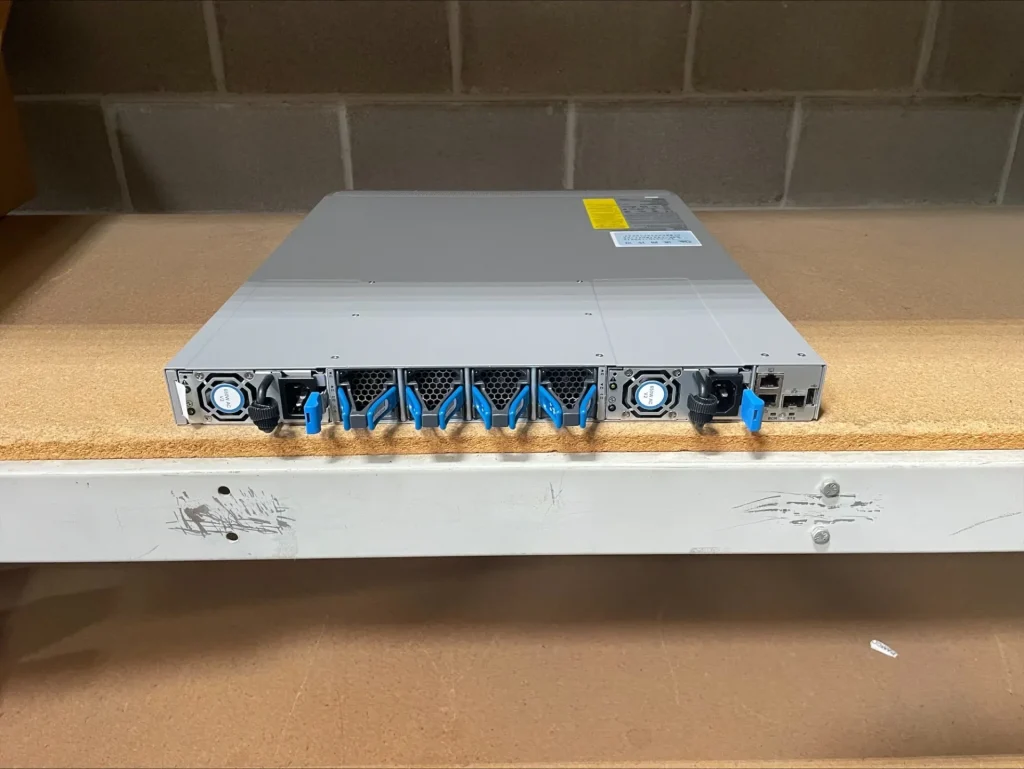When it comes to high-performance networking, enterprises and data centers demand switches that can handle massive data flows, ensure stability, and support advanced configurations. Cisco’s N9K-C93180YC-EX-WS switch, part of the Nexus 9000 Series, is one of the top choices in this category, but how does it truly compare against its competitors in key areas?
In this article, we’ll explore how the Cisco N9K-C93180YC-EX-WS performs against other popular switches in terms of performance, features, scalability, ease of management, and total cost of ownership.
1. Performance and Throughput
The Cisco N9K-C93180YC-EX-WS is known for its high throughput and low latency, making it a prime choice for enterprises with demanding data and application needs. It offers:
- 1.8 Tbps of switching capacity: With 48 ports supporting up to 25 Gbps and 6 ports supporting 100 Gbps, this switch provides a high-performance setup ideal for data centers.
- Low-latency performance: Critical for environments where speed is a key component of operations, such as financial services or scientific research.
Competitors: Many competitors, such as Arista and Juniper, also offer switches in this range with comparable port configurations and throughput. For example, the Arista 7280R Series is similar in its high-throughput design but may come with slight variations in latency and QoS features.
Verdict: Cisco’s N9K-C93180YC-EX-WS holds its own with strong throughput and minimal latency, making it highly competitive for organizations that prioritize speed and reliability.
2. Advanced Features and Flexibility
Cisco’s N9K-C93180YC-EX-WS is packed with features tailored to modern networking demands:
- VXLAN and EVPN support: Ideal for data centers transitioning to a fabric-based network, this allows seamless connectivity across complex topologies.
- Cisco Cloud Scale ASIC: Cisco’s proprietary ASIC enhances the switch’s capability to handle larger workloads efficiently and without bottlenecks.
- Flexible port configurations: It can handle 1, 10, 25, 40, 50, and 100 Gbps speeds, accommodating diverse network architectures.
Competitors: Arista’s 7280R and Juniper QFX5100 Series are also optimized for VXLAN and EVPN, providing similar flexibility. However, Cisco’s integration with Application Centric Infrastructure (ACI) provides additional options for software-defined networking (SDN), which many enterprises find beneficial for flexibility.
Verdict: Cisco’s comprehensive feature set and flexibility put it ahead of many competitors in SDN and port versatility, especially for businesses already invested in Cisco’s ecosystem.
3. Scalability
The N9K-C93180YC-EX-WS switch is engineered for scalability, supporting up to 48x 25Gbps ports and 6x 100Gbps ports. This configuration allows data centers to add capacity as needed without frequent hardware upgrades.
Competitors: Arista’s modular switches offer similar scalability but often at a higher price point. Juniper’s QFX5200 Series also provides a competitive level of scalability, although it may not integrate as seamlessly in multi-vendor environments as Cisco does.
Verdict: Cisco’s scalability combined with seamless integration in existing environments makes it a top choice for rapidly growing networks.
4. Ease of Management
Cisco excels in providing intuitive management options with tools like Cisco Data Center Network Manager (DCNM) and Cisco ACI. These management solutions streamline tasks like configuration, monitoring, and troubleshooting.
Competitors: Juniper offers Junos Space Network Director, and Arista provides CloudVision for centralized management. While each has unique strengths, Cisco’s tools are highly regarded for their user-friendly interfaces and tight integration with the Cisco ecosystem.
Verdict: Cisco’s strong suite of management tools sets it apart, especially for companies that prefer simplified management of complex data center environments.
5. Total Cost of Ownership (TCO)
The upfront cost of the Cisco N9K-C93180YC-EX-WS is typically on the higher end, which can be a consideration for budget-conscious businesses. However, Cisco’s hardware durability, extensive support network, and lifetime value often reduce long-term costs, making it a worthwhile investment.
Competitors: While Arista and Juniper may offer competitive initial pricing, Cisco’s support and longevity can reduce TCO over time. Moreover, Cisco’s frequent software updates add value without needing to replace hardware as often.
Verdict: Although Cisco’s N9K-C93180YC-EX-WS may have a higher upfront cost, its durability and support contribute to a strong return on investment over time.

